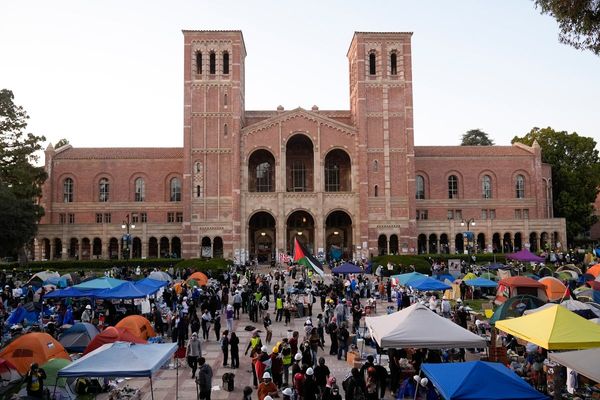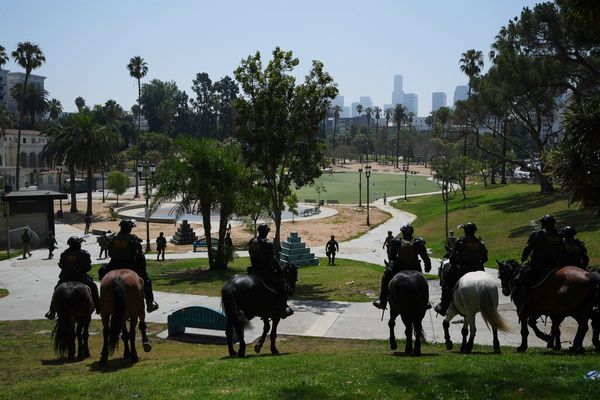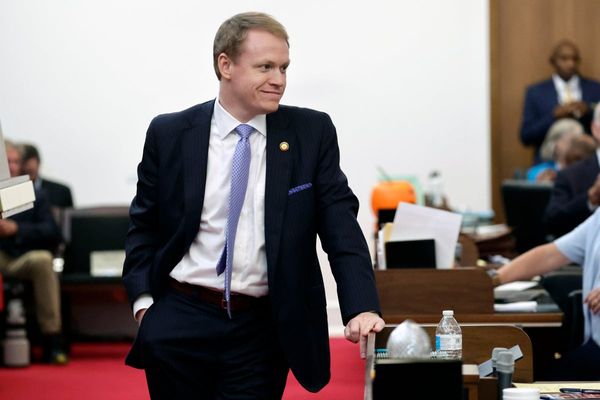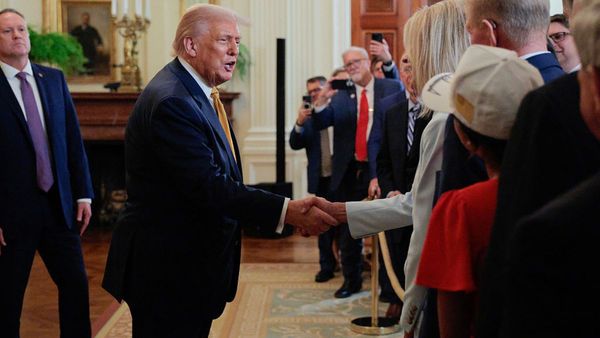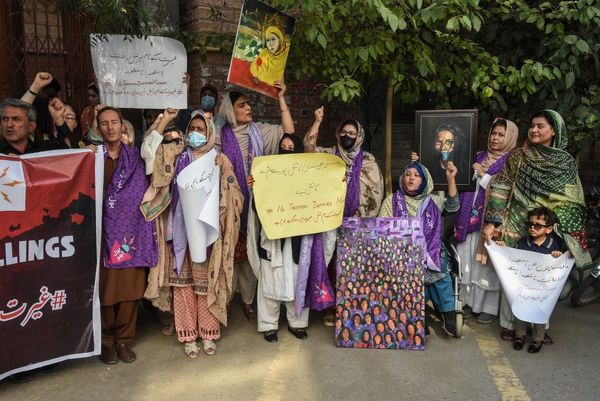CHICAGO — In the beginning, there was no pinball wizard.
“Tommy” was the fourth studio album released by the British band known as The Who and a colossal step forward when it came to rock music and narrative complexity. It was originally to be a mystical, psychological study of a traumatized post-war boy. No bumpers or flippers attached.
Pete Townshend was in his early 20s when he wrote most of “Tommy,” which was released in 1969. Now, as the album-turned-Broadway musical plots a Chicago comeback, he’s 78. With Townshend credited with music, lyrics and book and Des McAnuff as director, “Tommy” the musical opens soon at Chicago’s Goodman Theatre.
In the late 1960s, Townshend was enthralled with the notions of Meher Baba, the Indian spiritual leader who taught that the ordinary world is mostly illusory and that true meaning flows only from the inner transformation of consciousness. Pop music was still in the thrall of the three-minute single when Townshend began to bandy about the oxymoronic term “rock opera” and talk about a seemingly ephemeral, multi-song story of a “deaf, dumb and blind kid” who is let down by authority figures, including a sexually abusive uncle, but strikes out on his own path and not only survives but eventually attracts worshipers and becomes a kind of god.
The Who, specifically, were tough rockers. Drummer Keith Moon was known for kicking over his drum kit; Townshend himself was known for smashing his electric guitar, as well as for playing it better than almost anyone ever had. The band’s manager, Kit Lambert, was not much interested in talking about grander narratives of album length. To Townshend’s band mates, like lead singer Roger Daltrey, “Tommy” was one weird idea.
Then again, so was the Beatles’ “Sgt. Pepper’s Lonely Hearts Club Band,” an album with a kinda story and psychedelic sensibility that had come out in 1967. For all their hard-edged bona fides, The Who weren’t kids anymore and like any artists worth their salt, they’d begun to think less about trashing their instruments for anarchic effect and more about their lasting artistic impact.
“We had had this period of trying to write songs about who we were and what we were, and when I looked at them, I thought, ‘this is all waffle.’” Townshend said last October in a Chicago hotel. On the previous night, the latest incarnation of The Who (with Townshend and Daltrey) had sold out the United Center, where mostly mature (if that’s the word) fans had roared with pleasure as the familiar first chords of “Tommy” had cascaded from the stage.
Townshend is, and always was, a formidable intellectual who speaks in long, fast, nuanced sentences and has a clear-eyed view of his own complex creative past, necessarily lived in the for-profit music business with all the implicit compromises, promises, triumphs and irritations of being, well, one of a group of young, suddenly rich musicians with many different ideas for any path forward. Townshend’s typically was the one into the deepest possible forest.
“We were not creating a new world,” he continued, as if reliving a frustration of his 20s. “And I realized that it was because we hadn’t analyzed what had happened. We weren’t honestly addressing that what mattered to us was not whether or not we fell in love or had a family and a romantic life but rather that we could live. ... We were not perusing a religious movement. We were looking for teachers and leaders, but we found them in the dispossessed world of rhythm and blues and in early folk music. Woody Guthrie, hailed today as a great legend, was a bit of a broken man. But these were our heroes.”
He pauses.
“The work that I wanted to do with ‘Tommy’ was simply to save The Who, find myself, and be able to reflect out to our audience something where we could stand together and say, ‘What are we and what do we want?’ And so the story followed these needs.”
He stops. Townshend has not just offered a definitive explanation of the motivation behind “Tommy,” and where the mirror in the story came from. He has actually explained the reason for its success and longevity: a combination of a spiritual quest, a political statement, and a theatrically successful album that the youth of the late 1960s could immediately understand.
“Tommy” was first turned into a Broadway musical in 1993. Its Chicago reboot will be followed (or so the current plan goes) by a national tour and a return to Broadway, still under the direction of McAnuff, who brought the show to Broadway in the first place.
“What happened with ‘Tommy,’” Townshend says, his head cocked to one side and growing more animated as he speaks, “was that I just let it flow. It became the story of a post-war child, basically, and it became the necessary story of a post-war child — because I saw what was happening to The Who, what was happening to me and what was happening to the movement that we had started and celebrated, particular with the song ‘My Generation,’ which had said ‘it starts now’ and ‘there is going to be no more old men who had fought in the war who won’t (expletive) talk about it telling us to get out of their way. That will never happen again. We will be respectful of them. We will tip our caps. But they will not tell us what to do. We have thrown away their rule book.’”
Oblique as it might seem, you might plausibly say “Tommy” was one of the great baby boomer manifestos, a fancier version of, to borrow a phrase from Dee Snider and Twisted Sister, “We’re not gonna take it anymore.”
Townshend hasn’t said a word about pinball. But mention “Tommy” to most people and they think immediately of the monster hit “Pinball Wizard” and Townshend’s decision to turn the hero of the story into a maestro of flippers and bumpers, the like not previously seen in any amusement hall.
A few months later in a Goodman Theatre rehearsal room, McAnuff observes something along the lines of, none of this would ever have happened without “Pinball Wizard. “I think Pete understood that he needed to ground the story in something recognizable,” says McAnuff, a rock musician himself. “Otherwise, it would have been too much in the clouds.”
Townshend had to find something to root the deeply symbolic story of the deaf, dumb and blind kid in rock-friendly consciousness. And the “Bally table king” proved just the thing. “Pinball Wizard” has been played at almost every Who concert since 1969.
That is not to say Townshend had an easy time with his idea for a narrative album, a phenomenon later attached to the likes of Pink Floyd, David Bowie and, eventually, Green Day, Beyoncé, Taylor Swift, whomever. There was no rush to tell the story of a boy sexually abused by those “old men” and entirely let down by his father.
Their manager Lambert, Townshend says, was “uninterested in any spiritual possibilities of life as a journey,” as was the rest of the band with the occasional exception of the quizzical Moon. Still, Lambert ended up supporting, even driving, Townshend in the album’s creation; Townshend wrote much of it although others had a hand.
Had “Tommy” been a failure, Townshend says, he would have gone back to art school.
What the album did for Townshend, for The Who, and for rock music in general, was offer a richer narrative canvas. Its longevity eventually caught the attention of theatrical executives like Michael David of Dodger Theatricals, Rocco Landesman of Jujamcyn Theatres and Scott Zeiger of Pace Theatrical. That road led to McAnuff, who in the early 1990s was running the La Jolla Playhouse in Southern California. McAnuff had gone to a concert by The Who at the Hollywood Bowl and been told by someone that “Tommy” represented some of the greatest rock storytelling of all time — but the problem was that nobody but the band itself could perform it. “Oh yes, they could,” McAnuff thought, as comfortable with the hubris as with the implicit challenge.
First, though, Townshend had to be convinced. “I had been reluctant for a long time,” he says, “although musical theater was always something I valued. I always worried I would be betraying something about the system of rock. I worried I would be trying to get one form to do the job of another.”
As luck would have it for the Broadway people, Townshend had gotten on a bike in the Scilly islands around that time and promptly fallen off, breaking his wrist. A surgeon told him he would never play anything again, a prediction he has since belied but at the time, had him wondering if he needed to find something to do other than play guitar every night in front of thousands of people.
Shortly after, McAnuff found himself at a conference table with Townshend and his people. The first meeting went well and McAnuff knew he likely was going to get the gig. But the following day, Townshend was recording in the studio and so the director had time to flesh out his idea of turning a relatively skeletal narrative into a full-blown musical with a plot, characters and all the stuff a musical needs, a “tapestry out of what the album promised” being how McAnuff puts it. Townshend agreed to a La Jolla tryout but communicated through his lawyer that he was busy and didn’t want to be too much involved.
In fact, he got plenty involved. And he liked a collaborator who turned the album into a show and knew how not to scare off a rock guy with a healthy fear of over-literal interpretation, and of song endings.
“I said to him, ‘We don’t do endings, so you do the endings,” Townshend says. McAnuff obliged.
When “Tommy” showed up as a musical, plenty of fans of Townshend and The Who, listeners who had created their own visual pictures in their heads, parsed every decision made. “Quite a few intelligent people were irritated that I had allowed Tommy to put his hand on his father’s shoulder, inferring that he was forgiven,” Townshend says, ”thus inferring that the whole of the generation that rock was supposed to be standing up against was to be forgiven. But in my life and my history, my aim actually was not to be antagonizing to the previous generation, but to say we were different.”
“Tommy” was remounted at Canada’s Stratford Festival in 2013. On opening night, Townshend could be seen in a bar, soaking up the milieu as McAnuff, who then was festival artistic director, picked up a guitar himself.
But that production was generally similar to what had been seen on Broadway. The version opening June 26 at the Goodman is a fundamental reboot.
A visit to rehearsal reveals that the new production, which stars the largely unknown Ali Louis Bourzgui in the title role, will be more skeletal than before, more symbolic, more of a glancing blow, as it were. The pinball table is an outline. The images are somewhat more ephemeral and the setting more metaphoric and contemporary. Theater technology, especially sound, has advanced leaps and bounds since the early 1990s and plenty happens that was not possible before. One song has been cut: a darkly satiric number called “Tommy’s Holiday Camp,” which brings back the abusive character known as Uncle Ernie, a figure who is probably best seen as little as possible these days, even though “Tommy” actually was ahead of its time in its condemnation of the sexual exploitation and abuse endemic to its era, and beyond.
“The world has changed since 1992,” Townshend says, seemingly genuinely intrigued by what is to come. “We expect people to suspend the need for there to be any kind of echo and, most of all, we expect them to be able to be ready for a psychic or a spiritual or an emotional connection to come from between the lines of the play.”
He then talks about a moment from the previous night’s concert, when someone loudly shouted out, “I love you, Pete,” and he had not responded with so much as a glance, let alone a response in kind.
“Those moments are very dangerous,” he says. “Roger usually spots them before I do. One cannot speak.”
———
“The Who’s Tommy” is now in previews and runs through July 30 at the Goodman Theatre, 170 N. Dearborn St.; 312-443-3800 and www.goodmantheatre.org.
———

